Travel guide to Japan’s Cat Island & Fox Village! Japanese cats at Tashirojima, Tokyo drag queens & Goth club Witch Garden.
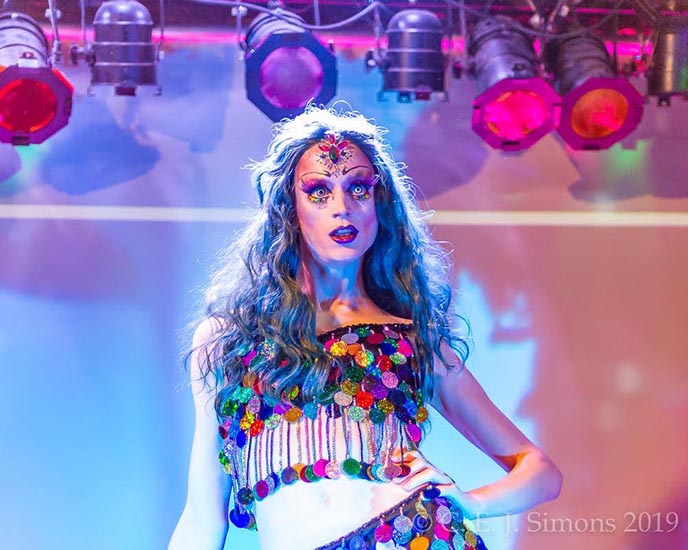
She’s back… I’m delighted to present a travel story by Yukiro Dravarious, aka Tokyo drag superstar Die Schwarze Frau!
Did you know Japan has a fox village, and an island of cats? In this special post, Yukiro takes you inside these bizarre Japanese attractions that are sure to enthrall any animal-lover.
PS, Goth alert: Yukiro and DJ Sisen are having an old-school Gothic party in Tokyo, on Saturday, September 15! See the end of this post for details, and I hope you can make it to their spooktacular club night Witch Garden – details here.

In the words of Yukiro:
What a dream come true! For a birthday gift this year, I got to travel to a Japanese Cat Island and Fox Village. Just as the names suggest, these places feel like entering an old school children’s picture book. Being surrounded by human-friendly fuzzy felines and foxes was tremendously fantastic.

Even after living in Tokyo for 12 years, there are always new things to explore in and outside of the capital. I heard of the notorious Cat Island, aka Tashiro-Jima (田代島) last year. Ever since, I’ve been looking for a good opportunity to visit this isle inhabited by hundreds of cats.

(Quick fashion break before we continue to his foxy and catty travel adventures!)
Yukiro is a huge part of this blog for 10+ years, and I wanted to give you an update on his many creative pursuits in Tokyo. He performs regularly as Die Schwarze Frau, a frighteningly fierce Gothic drag queen, with regular shows in Tokyo.
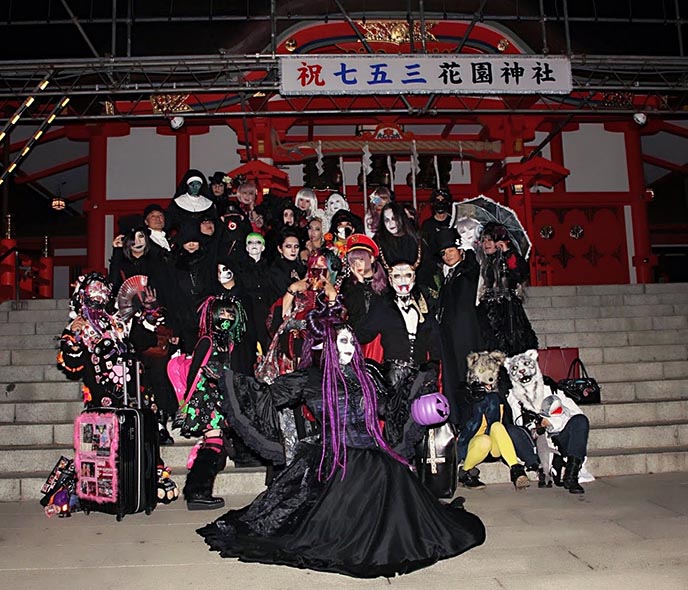
Above, how fierce is the Tokyo Goth and drag fashion scene?
Yukiro and his friend Julia are currently filming a video series, which dissects each episode of the Boulet Brothers’ Dragula (Goth drag queen competition show). Want to know who’s their pick for the top super-monster? You can cackle over their catty remarks every week, on Yukiro Dravarious Youtube.
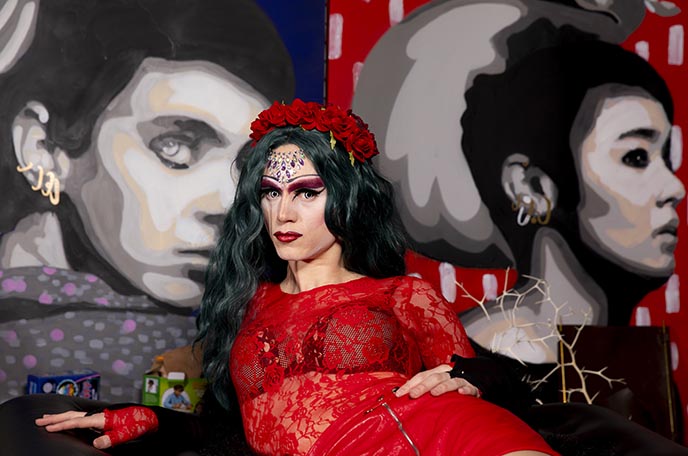
Yukiro never fails to astonish the universe with his out-of-this-world “lewks.” These promo photos for Tokyo Pride Week are by Aleksandar Dragičević (Alexlens.com and @genkiserb Instagram).
I’m always amazed at how he can put together outfits from unexpected materials — living for this Red Queen transformation. And how fab is the makeup?
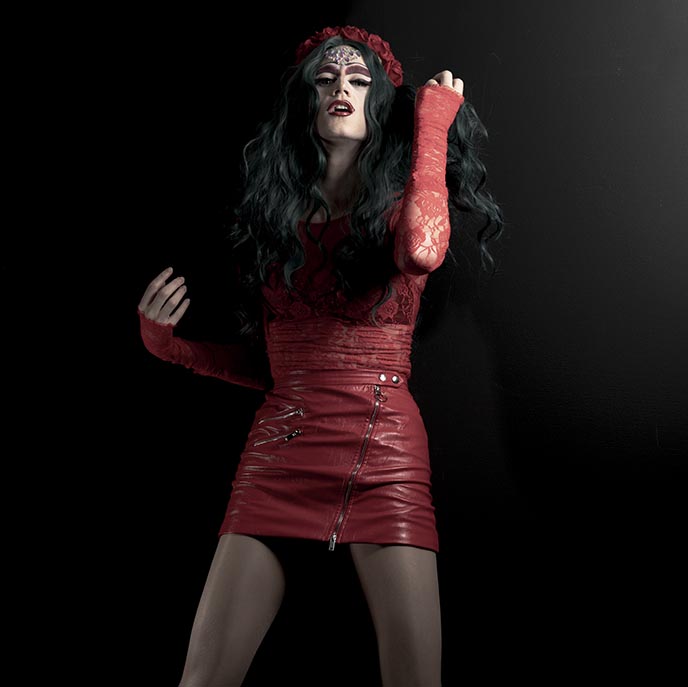
Take a dash of Halloween horror, and add glam rocker confidence… The spooky queen reighneth!
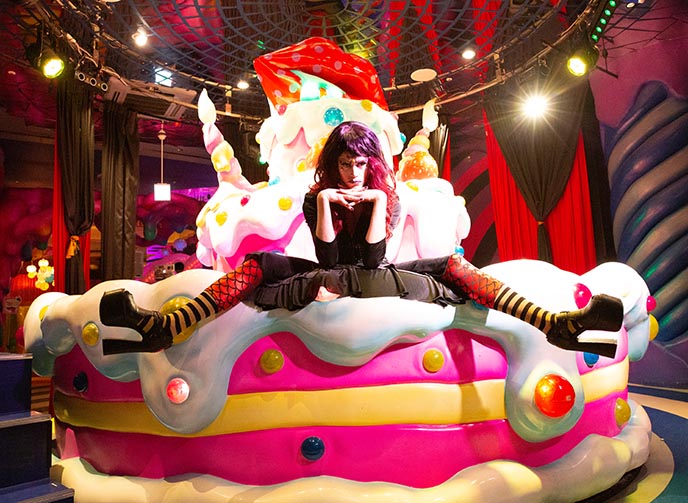
Yukiro’s also busy filming a new B-movie, and does drag shows regularly at Harajuku’s Kawaii Monster Cafe. (The next dates are 9/12 & 9/26).
If you’d like a piece of this dark cake, scroll to the end of the post to see Die Schwarze Frau’s upcoming performance dates (including the Witch Garden Gothic party on September 15 in Tokyo).
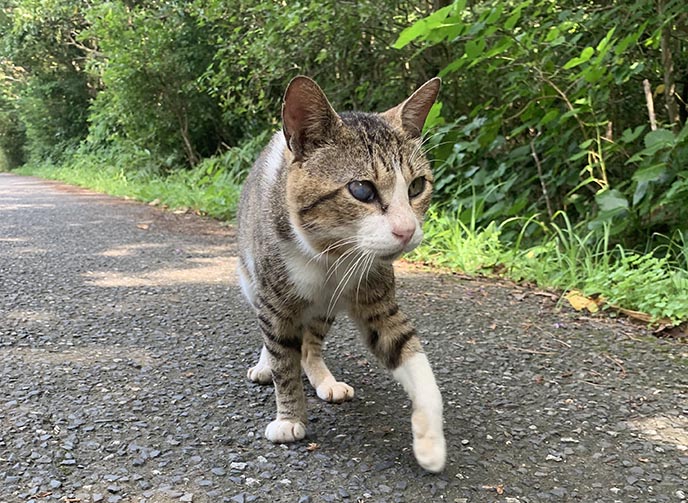
Now, let’s step back into Yukiro’s Japan travel story. Take it away, queen…
Going to the Cat Island in Japan is more or less of a fuss, which makes it so much more rewarding when you finally arrive. First, you must travel to Sendai (仙台). The fastest way is from Tokyo Station by shinkansen (bullet train). If you’re on a budget, you can take local trains or buses, but that takes a good half day of transit…
From Sendai, you must then travel to Ishinomaki (石巻) by train, or by the cheaper bus. Ishinomaki was hit hard by the tsunami from the earthquake disaster on 2011-3-11, and had to be rebuild. The nearby cat island, Tashirojima, was also badly damaged... and that of course had it’s turn on the poor cats.
We often forget about animals when a disaster like this happens, and how badly it effect every living being. Nowadays, the island’s cat population is a mere fragment of what it used to be. Nonetheless there are still many cats around.
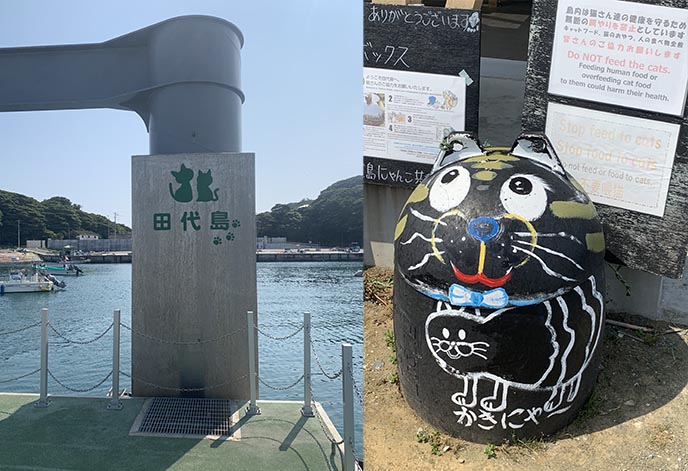
How to take the ferry to Cat Island: We woke up early the following day to catch the morning ferry from Ishinomaki port to Tashirojima. There is a bus from the train station you can take to the port, or you can walk for 10-15 min. You have to buy the tickets to the ferry in a separate building from the port, but it wasn’t too hard to find. The ferry takes approximately 40-50 min.
There are usually only 3 ferries going a day, so make sure to check up the times before going. Once on the island there are lots of signs and time tables showing what time the next boat will come.
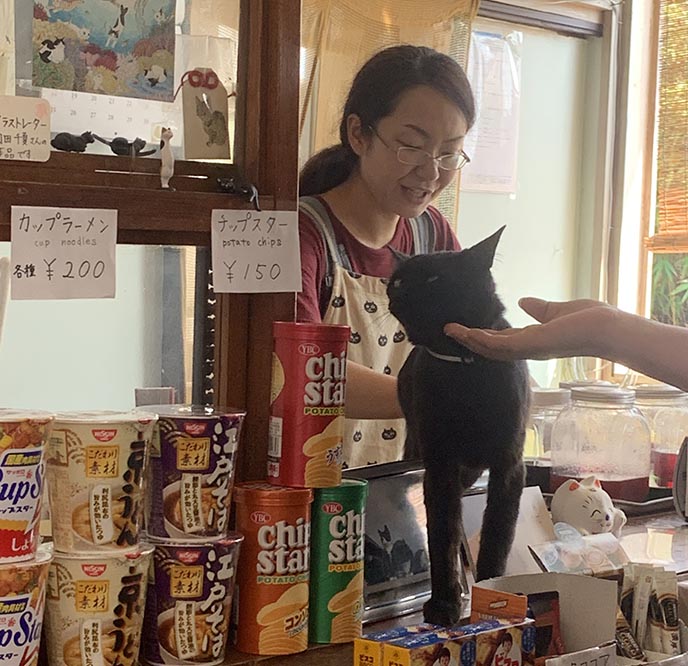
There were clear instructions and signs on how it was prohibited to bring dogs to the island, and to not feed the cats. I was very happy to see these responsible restrictions.
It was as big contrast from my trip last year to the Rabbit Island, which is also highly recommended. (It’s called Ōkunoshima, 大久野島, and located outside of Hiroshima). Over there, a lot of tourists were feeding the wild rabbits and it was even encouraged by the islanders.

Tashiro-Jima’s cats were used to tourists and sometimes let you pet them! They all seemed to be from the same cat species, a tinier sort that is super adorable.
When there are many cats around you, you can clearly see how different each cat’s personality and expressions are. “Meow” — or as in they cry in Japanese — “Nya, Nya!”

There was not much to do on the island itself, other than see the feral cats. One of the highlights was to visit the Cat Manga Museum. We found various cat drawings by very famous Japanese manga artists, such as one of my heroes Nagai Go (above left – the artist who draws Devilman, Cutie Honey etc). A fun fact; it is said that before Tashiro-jima was known as the Cat Island it was known as the Manga Island!
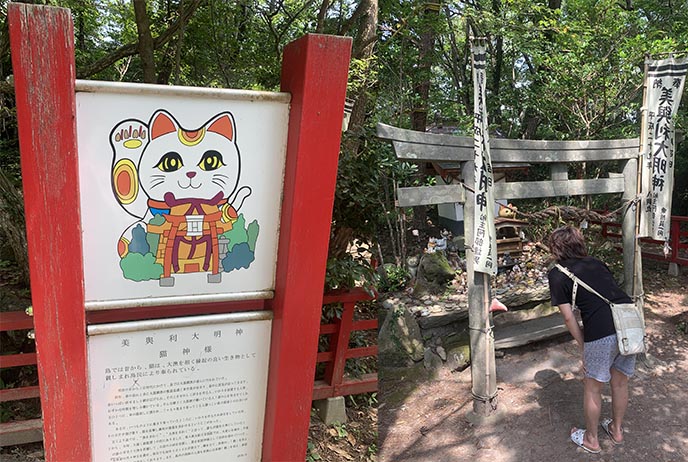
The second and final sightseeing spot was Neko-jinja, the cat shrine (猫神社). Besides that, you can walk around the small island in less than 1 hour.
The entrance featured a maneki neko with a raised lucky paw.
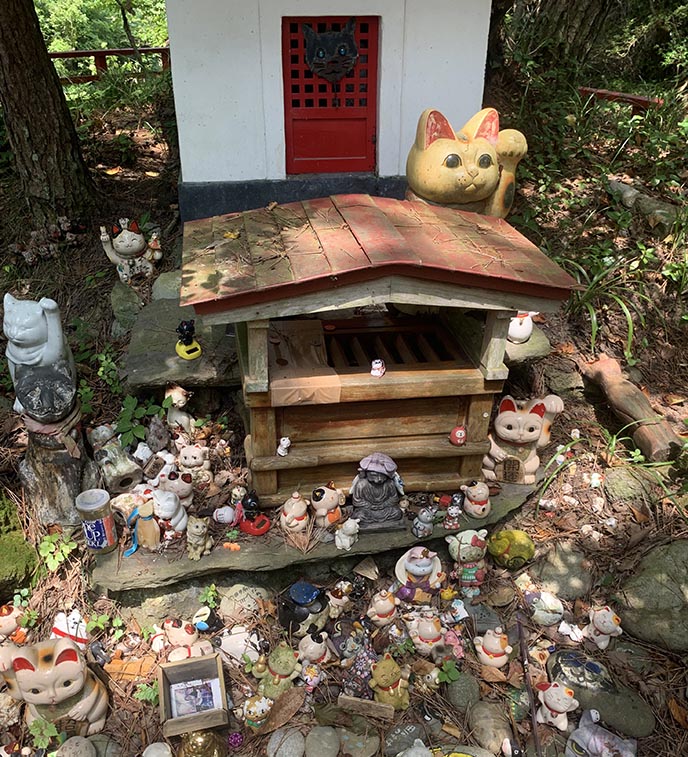
Many visitors left little kitty statues and offerings at the Japanese neko shrine.
(La Carmina’s note: There are actually about 12 cat islands in Japan, aka islands inhabited mainly by kitties. Another popular “Cat Island” is Aoshima, which is located in Ehime Prefecture.)

We enjoyed taking shelter from the sun inside one of the many hidden cafes. This one is called Black Cat Cafe, or (黒猫堂) Kuro-neko-dou. Despite the name there were several cats inside with collars, in many different sizes, colors and shapes.
We indulged in black coffee and their speciality, Cat Curry. The only thing kitty about it was the shape of the rice. Still, it was rather fun to eat it on the cat island.
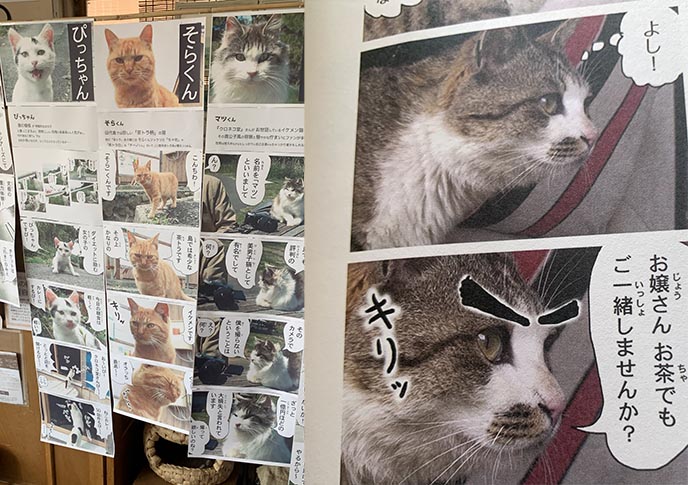
At this cafe there was also a comic exhibition of famous cats from the island in manga style. They had drawn-on evil eyebrows and spirally cheeks. Naturally I liked the malicious looking cats the most!

I wouldn’t set my foot in most cat cafes, as the ones in Tokyo tend to treat them badly. Super small cages and constant abuse from tourists, with a few exceptions of course.
But on this island the cats were not an object for customers. They are the primary residents could come and go as they wanted. Sometimes the cafe cats even helped by jumping up on the cashier and tumbling around in the goods.

One of my best memories was how in the middle of the road, a snake and a cat were communicating and somewhat starting a fight. Both of them were very stubborn and refused to budge. I think the cat got bored after a while or the snake won the staring competition… since the cat walked away after a few futile attempts to paw its tail.

What to pack for a trip to Cat Island: I recommend bringing the following necessary items: 1. Sun lotion, as it gets very hot and there is little shade outside. (La Carmina note – one should wear sunscreen year round!) 2. Mosquito repellent. 3. Sunglasses and sunhat. 4. A book or phone game while chilling in the shadows. 5. A good camera 6. Hand sanitizer to put on after cuddling with the nekos.

There were a lot of cat souvenirs everywhere as one could figure. We were in awe after seeing DVDs of cats who had become celebrities on the island.
I would totally like to go back again to Tashirojima, the island of cats. I assure you it will be a dear memory to cherish especially if you are a cat person like me!

This summer, I also travelled to Japan’s Fox Village. Cat Islands – sure that is a thing, but a village of foxes is completely out of this world!
Foxes are a strange fascination, as they are undeniably cute but also predatory. I grew up in the countryside, where you always hear stories about how a sneaky fox went through the fence and got some chickens or rabbits. They are very smart animals and should be handled with caution.
That being said, the Fox Village is a breeding center so these animals are accustomed to humans. Still, as the sign says before you enter, they don’t take any responsibility for injuries… so enter at your own risk, mohahahaa!
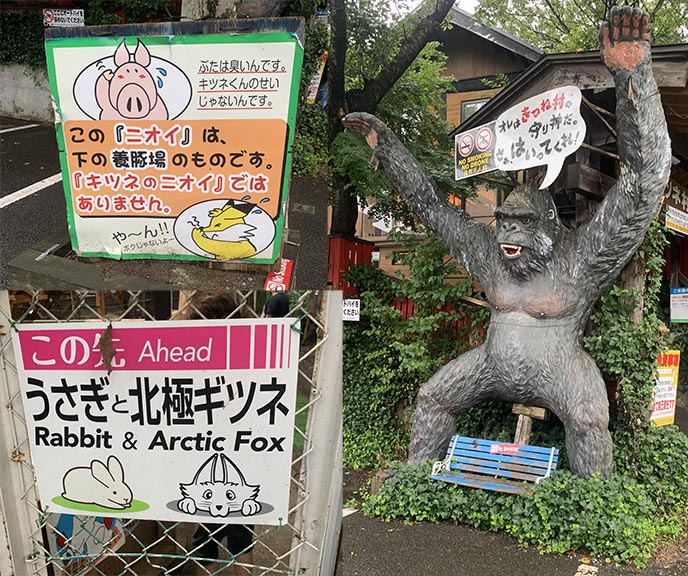
How to get to the Fox Village:
Zao Fox Village, or Zaoo Kitsune Mura (蔵王狐村) is located in Miyagi prefecture — also a remote and tricky place to get to. We first went to Shiroishi (白石駅) by train from Sendai. I believe most people travel to the village by car (from Sendai it would be a 1 hour car trip, and from Tokyo it would take 5 hours).
We took the bus from Shiroishi station to Zao Fox Village. There seems to only be one local bus going there in the morning around 7:30 am and one back at 2pm… on Tuesdays and Fridays only.
If you go there on a budget, the 1 hr bus ride is recommended. However getting a taxi is also a valid option if you have 3-4 people sharing. We actually did that on the way back and it was only 4000 yen, or 1000 yen each – not bad at all, and way faster than the bumpy bus ride.
Once at the Fox Village you’ll get greeted by… a gorilla!?

There are a lot of “do not” signs everywhere, but don’t worry. Before you enter the area, the staff will show you very clear instructional pictures about what is allowed and what is not.
Most of the staff could make themselves somewhat understood in English, since they now have many tourists from outside Japan. Just be rational and treat the animals with respect, and they will do the same to you.

You are not allowed to touch any foxes, and the youngsters / rarer species are locked in cages. They have over 100 foxes and a total of 6 different types. Some are in different colors like the marvelous white and black foxes. They all were utterly cute!
I especially was struck by how they curl up in a ball and use their tails as pillows to snooze on. Their tails are truly magnificent; as long as their bodies if not even longer, with an oval shape and super fuzzy. No wonder fox fur and tails are luxurious products… (I’d never purchase or support the fur market though!)

There was some rabbits and goat kids around too. One of the horned goat kids managed to escape several times and made quite a scene, to our delight. But he got swiftly carried back again by the care-takers.
Some of the cages were, by my standards, way too small for the poor animals. That being said, the biggest cage had 50-80 foxes sleeping and hanging around – a broad and spacious playground where they run freely!

It was a fabulous and unreal sensation to be surrounded by so many foxes. If you reached out your hand you could easily touch them – but you are not allowed to!
You should never show them fear because they will take that into their advantage. No plastic bags or hanging objects are to be carried with you, not even your wallet. They might take a bite at it if its sticking out of your pocket.

Be prepared for quite an intense musky smell around the foxes. Also, in the summer, most of them are in the midst of shedding their furs. There were even signs that said “I’m sorry for being ugly, we are just changing our summer furs.”

The most amusing episode was when my travel partner Kenichi was scent-marked by one of the foxy creatures, in the middle of the sidewalk. So he is now in their possession… it was nice knowing you (666)!

The staff checks the foxes for pests or sickness each year, and take cares of them with vaccinations and care. Therefore, the facility is supposedly completely safe from diseases.

They provided hand sanitizers and hand washes for visitors, before you go into the bigger cages. Grandma’s tip: always wash your hands thoroughly after touching wild animals!
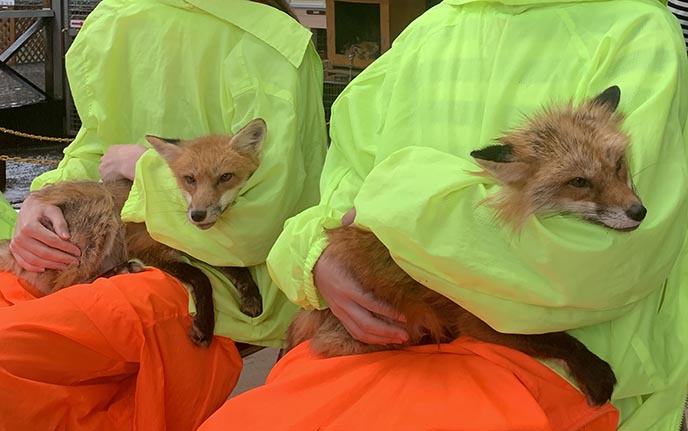
Another highlight was the “photo and holding a fox session,” which they do once or twice a day at certain hours. We waited for our turn, and got to wear raincoats and trousers over our clothes (to avoid getting them dirty or smelly) while holding a fox.
It was very safe with plenty of staff making sure nothing went out of hand – literally! The foxes we got to hug were probably trained for this and accustomed to humans. However they are predators and unpredictable tricksters, so you better listen and follow the instructions being given.
You got to take a photo while holding the fox for 1500 yen extra – but it was so worth it. Feeling their heartbeat and having one on your lap is such a trip, and cuteness overload.

Here too there was a lot of overpriced merchandise in the souvenir shop, all with fox motifs. There was no food court or food stand when we were there so I highly recommend bringing rice-balls, food and drinks to the rest area.
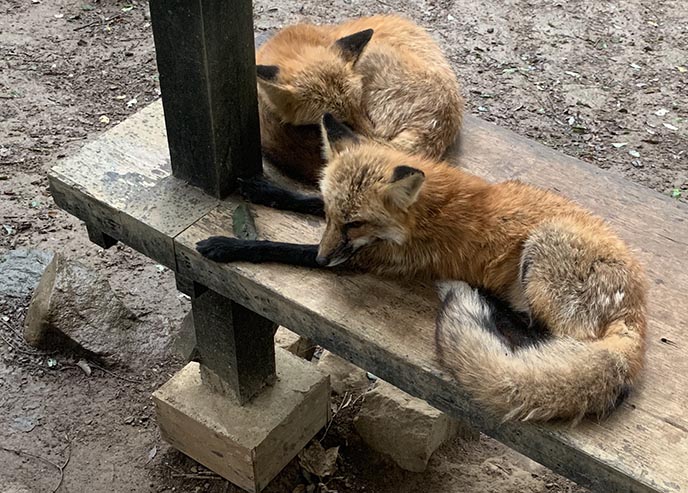
What does the fox say? “Kyuun Kyuun! Kon Kon!” Foxes are a sacred auspicious animal in Japanese spirituality, and you can see temples (Inari-san) with fox motifs and masks worn at certain festivities.
It became very clear to me after being to the world’s only Fox Village why Japanese people love foxes so much! For all of you foxy ladies and furry lovers you simply must go visit when the opportunity comes.
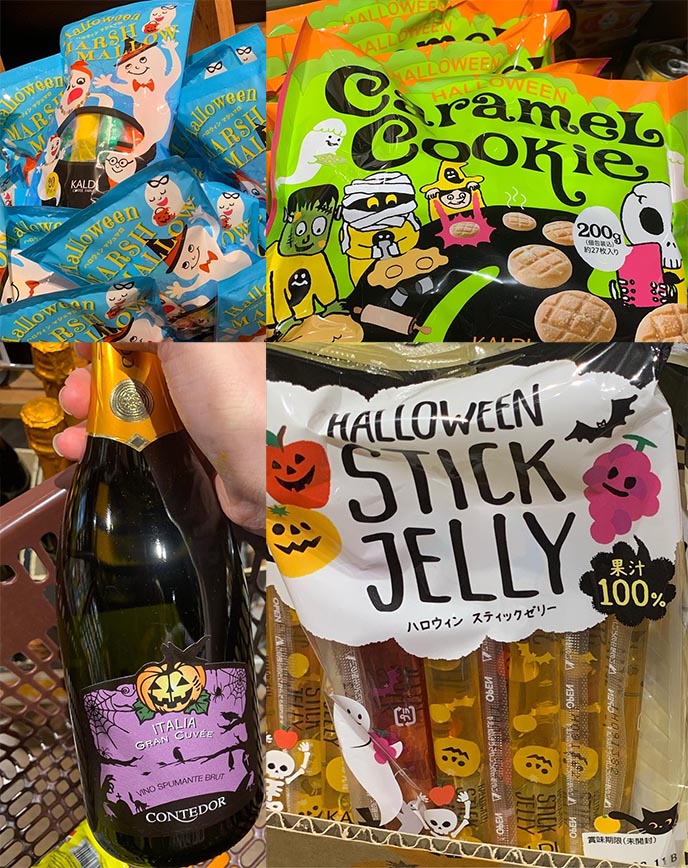
I leave you with some of Yukiro’s Halloween snaps from Tokyo. Already, there’s a ton of spooky snacks, candy, and even wine in stores… (You can shop for Halloween design goods here.)

Trick or treat? In Japan, everything is packaged with distinctively kawaii-cute designs. You won’t see smiling pumpkins and happy ghosts like these in North America. My favorite is the nori (black seaweed) bat on the right!

At 100-yen stores like Daiso, you can shop til you drop dead for Halloween goods. There are racks of ghostly merchandise at Tokyo “dollar stores” right now… perfect for a Day of the Dead party.
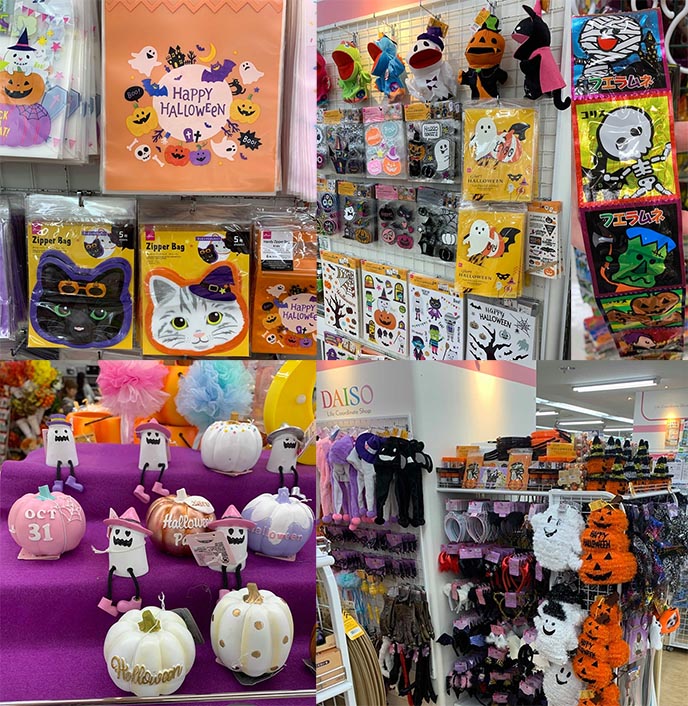
Stickers, costumes, party decor, makeup… Halloween is here, my friends, and I couldn’t be happier.
If you aren’t in Japan, don’t worry — you can find spook-tastic decorations and home goods online here.

Now, the most important announcement! Did you know Yukiro and DJ Sisen launched a Goth party in Tokyo, called Witch Garden?
The next one is coming up on September 15th, at Shinjuku Club Science. It starts midnight, and is 3500 yen at the door or 3000 yen in advance. Please press “going” on the Facebook page for an advance discount, and to see all the details of the performers.
The witchy event has a theme each time, and guests love to dress up to the nines (it’s encouraged, but not mandatory). This time, the theme will be Medieval Witches. Above, you can see a video of the past party (Witches from Space) to get a sense of the atmosphere.
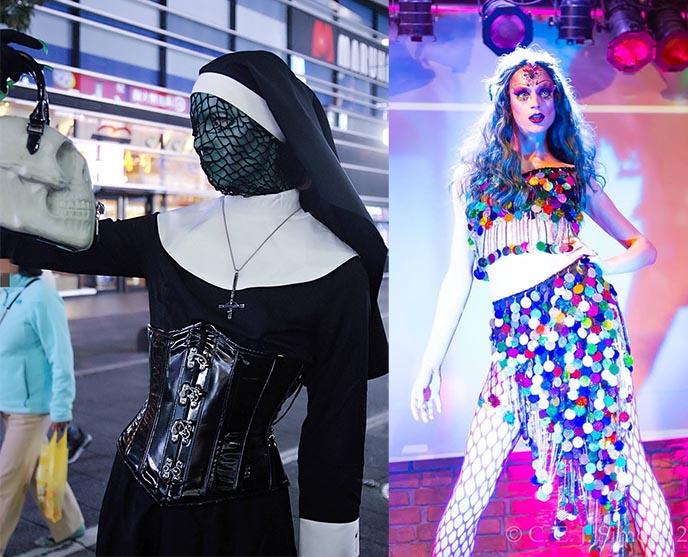
Yukiro writes: “The Goth and alternative scene in Tokyo has been slowly but steadily dying and we’d love to get your help in raising it from the dead. Even if you can’t come, we’re grateful if you can post about it on social media, to make people aware that this amazing party is happening!” See all the info about Witch Garden here.

You can also catch Die Schwarze Frau’s Gothic extravaganza drag show at Kawaii Monster Cafe in Harajuku (9/12 & 9/26, and ongoing).
Did you know about Japan’s Cat Island and Fox Village before this story? Would you like to see more guest posts on this blog by Yukiro?
I hope you’ll get a chance to party with him and DJ Sisen at Witch Garden, the next time you’re in Tokyo!
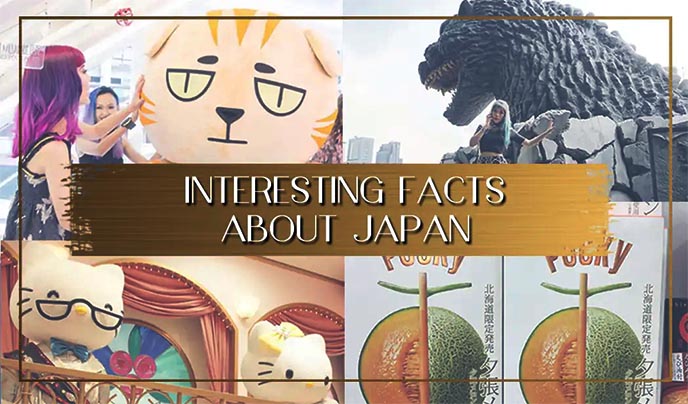
PS: A quick update from La Carmina – I’ve been busy guest-writing Japan articles for Once In A Lifetime Journey, the luxury travel site run by my friend Mar Pages! So far, I’ve written a bunch of Japanese travel guides — including fun and interesting facts, where to shop, what to eat, and things to do all over the country. You can read all my Japan guest posts here.
SHARE & COMMENT
Visiting teamLab Borderless Digital Mori Museum & Planets Tokyo! For Love & Lemons dress, Hermès Collier de Chien.
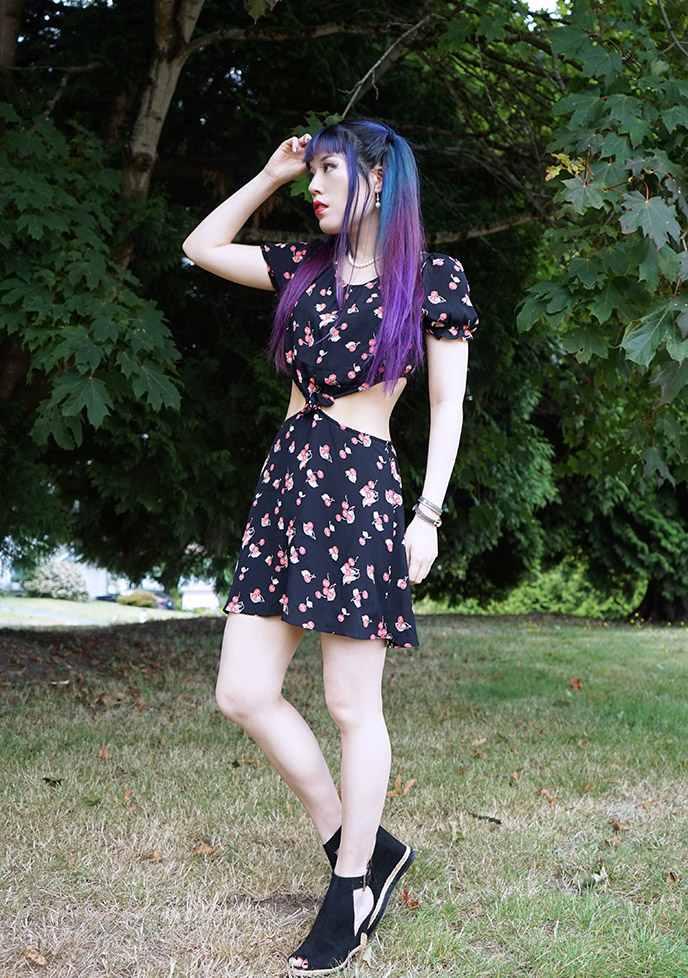
Before I take you inside the Tokyo teamLab museum — I wanted to thank you for the birthday wishes on my Facebook and Instagram! I took these quick outfit photos on August 17, before celebrating with friends.
OOTD: I’m wearing a cherry print mini dress with a cut-out waist by For Love & Lemons, and black platform sandals from Le Babe by Ferca Italy.
If you haven’t heard of For Love and Lemons, I think you’d love the dresses below (click the images to see):

I accessorized with a short pearl necklace from Japan, and here’s the current hair situation.
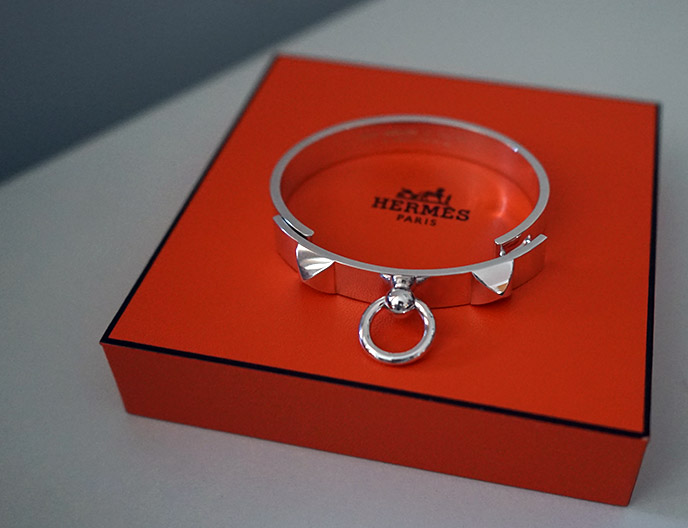
I had a lovely birthday, with plenty of surprises. Still can’t believe I received this fantasy bracelet… a Hermès Collier de Chien.
This is the silver CDC small model hinged cuff (Hermes has various versions with different hardware, leathers, and sizes). The studs and dog collar O-ring give it Gothic BDSM vibes — a perfect fit.
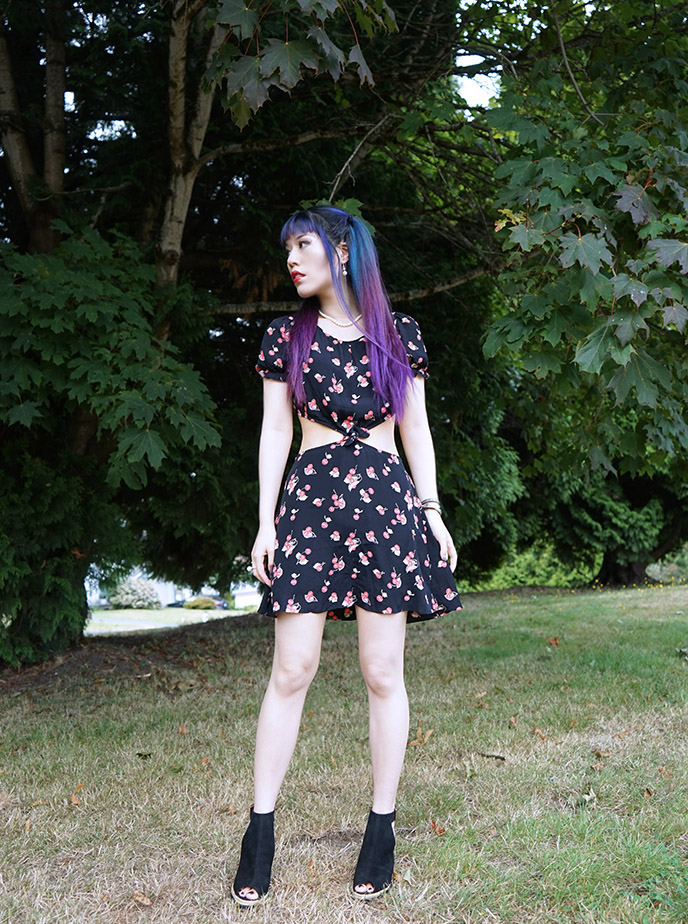
What I wore on my birthday, for a party. This short sleeved For Love & Lemons dress is as summery as I’ll get. The cherry print sundress has a 1990s feel, with revealing cutaway sides and a tie front.
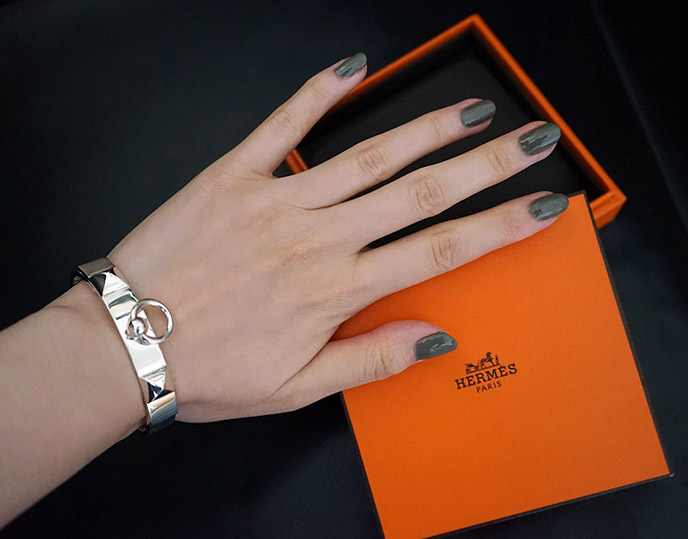
Couldn’t resist taking some closeups of my first Hermès Paris jewelry and the iconic orange gift box. Love the minimalism of this silver collier de chien design (it’ll go with all types of outfits). The Medor pyramid studs and circular ring give the CDC bracelet a Goth punk S&M edginess.
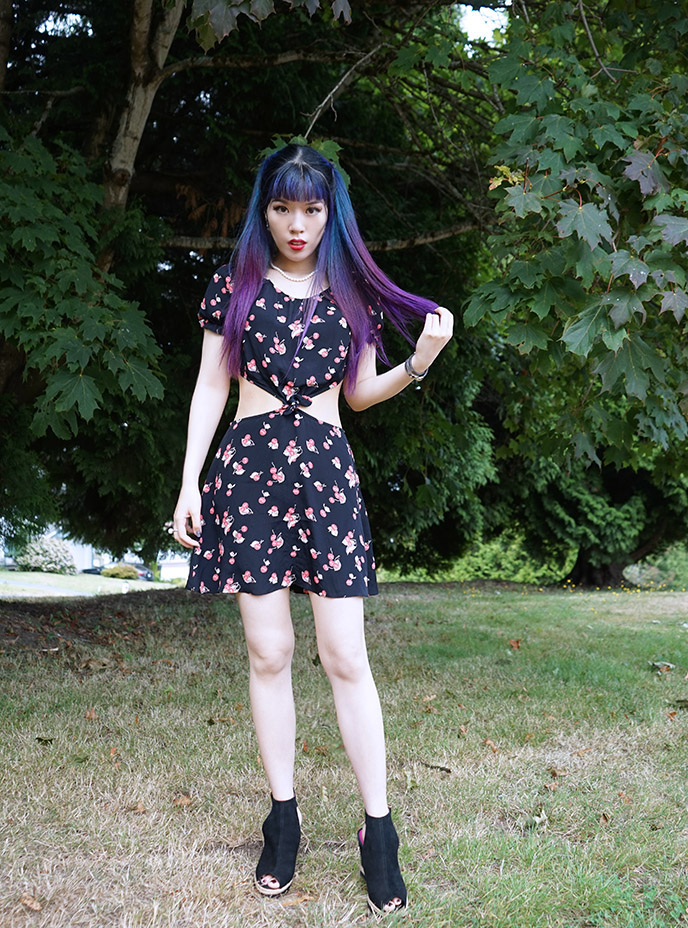
I matched my For Love and Lemons cherries dress with Le Babe peep-toe sandals. See more of my favorite black platform shoes below:
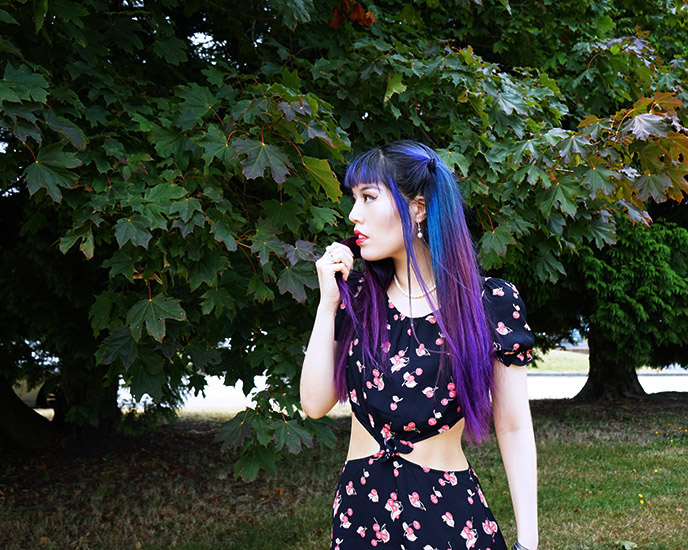
Thank you again for the well-wishes, as another year goes by. Now, let’s segue into my guide to visiting Teamlab, the hottest new museum in Japan.
Every time I visit Tokyo, there’s always something new and wild to discover. On my last visit, my friends and I received a private guided tour of the Digital Mori Museum, by one of its creators!
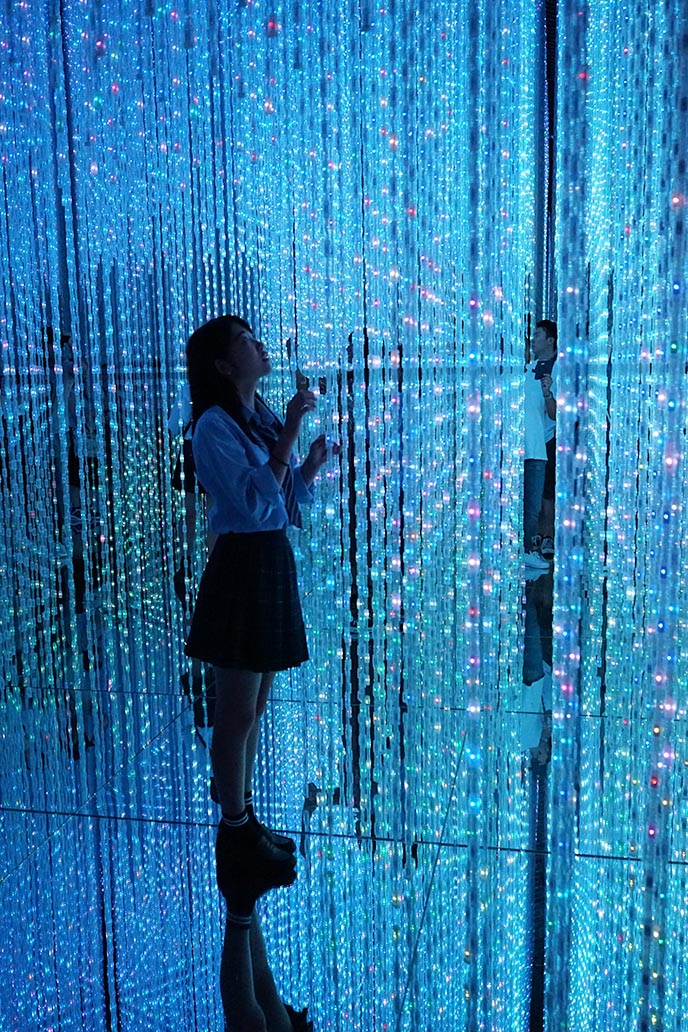
I’m sure you have heard of (or seen scintillating photos) of Tokyo’s recently-opened teamLab Borderless and Planets. These museums push the boundaries of futuristic technologies, and encourage you to interact with art in unexpected ways.
Read on for a full guide to visiting teamLabs Planets and Borderless in Tokyo — including the difference between the two museums, how to get tickets, and more.
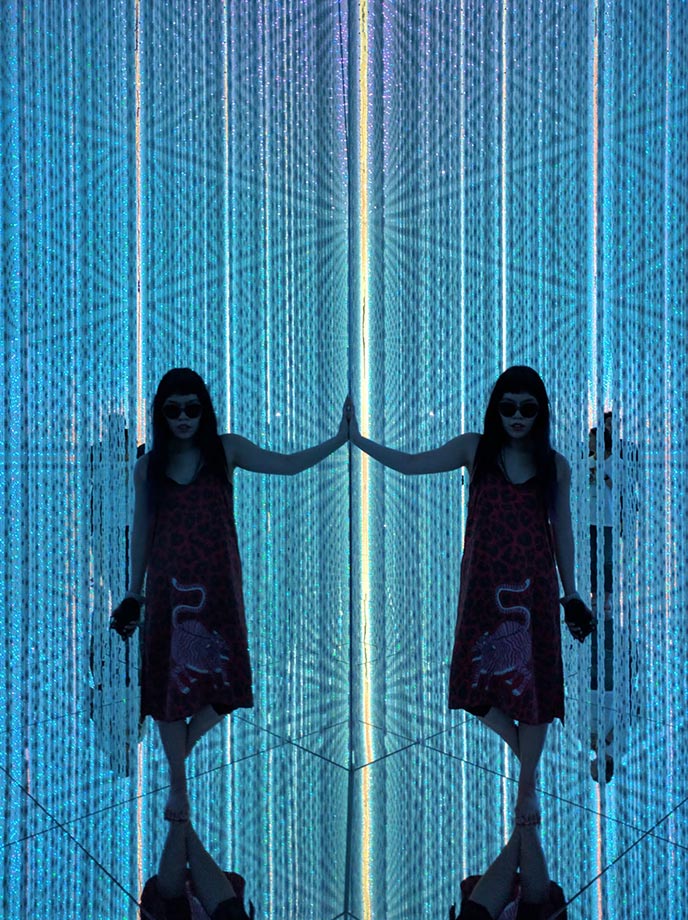
Japan’s teamLab collective dreams up contemporary art exhibitions, with a focus on interactive media. In June 2018, they established a permanent location in Tokyo’s Odaiba.
As you might guess, the Mori Building Digital Art Museum is extremely popular with both locals and travelers. Tickets sell out quickly, so be sure to book passes well in advance from their website.
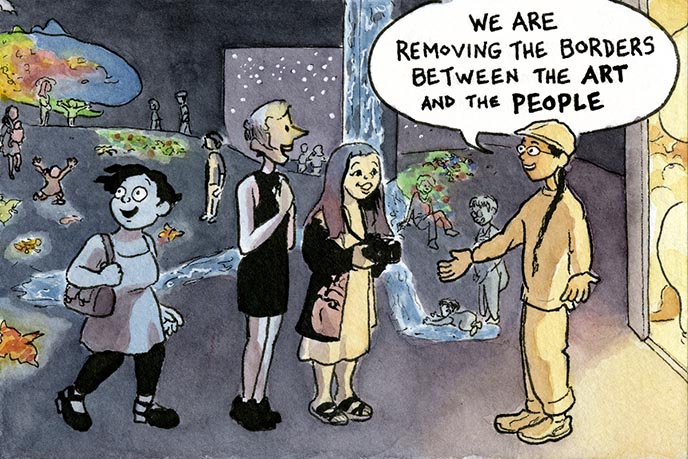
I visited teamLab Borderless with Portland-based artists Becky Hawkins and Naomi Rubin. We were fortunate to have a personal tour with Takashi Kudo, a member of the Digital Arts Collective that created this exhibition.
Becky made this watercolor postcard that perfectly illustrates how mesmerized we were by this digital wonderland.
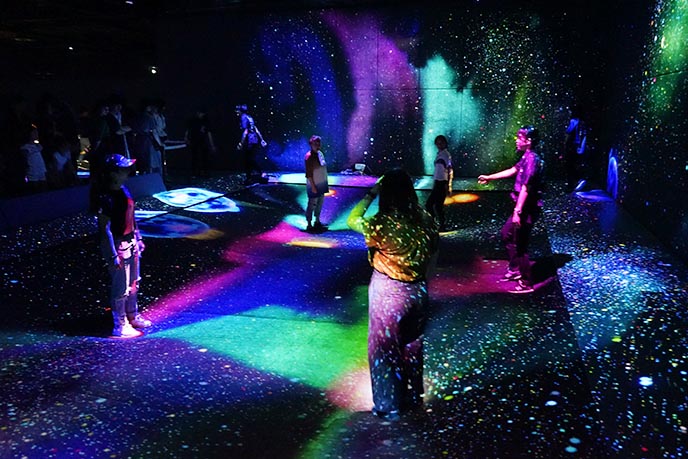
We walked into a series of rooms with no boundaries, spanning 10,000 square meters. The digital artwork is generally divided into five zones, each transitioning seamlessly into fantastical new worlds.
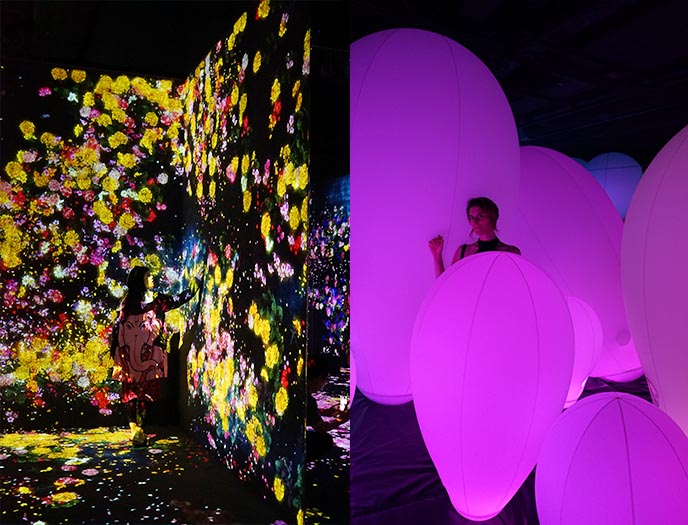
The digital works are in constant motion, and flow over the walls, floors, and ceilings. We were awed by how the art responds to your presence: for instance, the flowers changed pattern and color at my touch.
At traditional museums, the staff puts up barriers and yells “dah-meeee” if you get too close to the art. In contrast, teamLab Borderless invites you to experiment, touch, and play with everything you encounter. Naomi illustrates this by bounding through the balloons (which change color) in the “Weightless Forest of Resonating Life.”
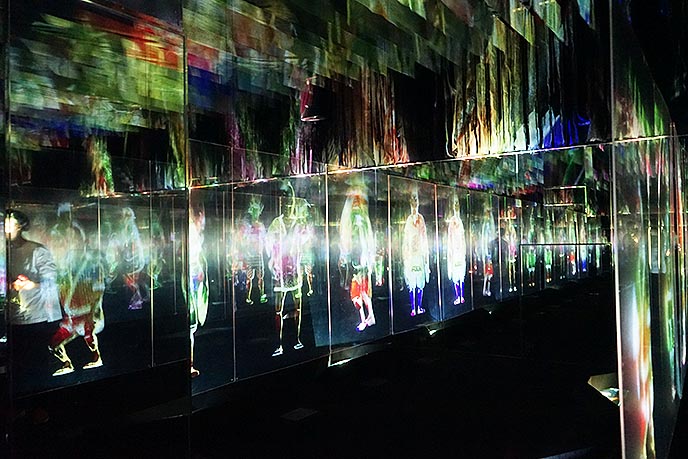
Photos and video don’t do justice to teamLab Borderless. You’ll have to come here yourself, to see how it feels to wander through the ever-morphing exhibits.
This room had rows of glass panels, each with a translucent human or animal figure wearing a Japanese festival outfit. When you stop in front of them, they’ll perform different enka dance moves, and emit various sounds. The music and visuals are therefore constantly changing, depending on the number of people interacting with them.
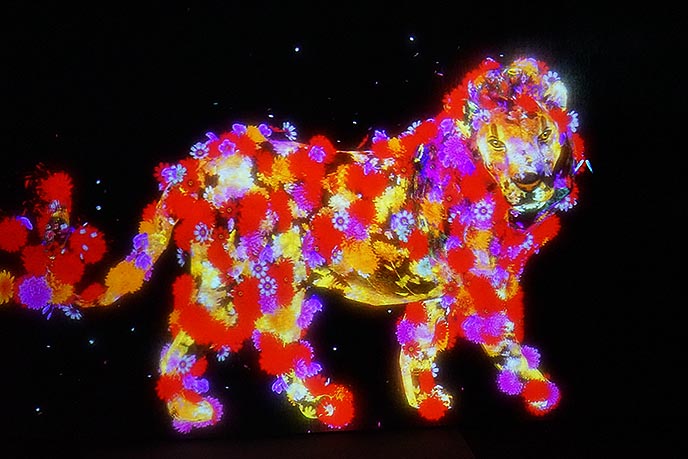
This lion covered in flowers strolled through Borderless World, a zone inspired by nature. Likewise, your presence and actions will affect the way the creatures emote.
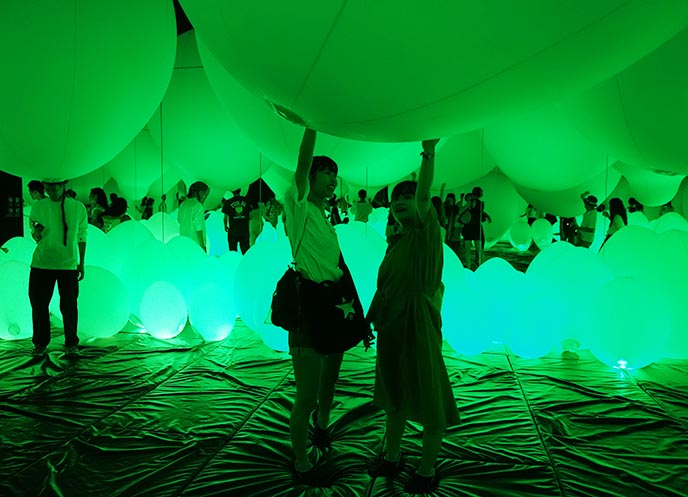
One of the most Instagram-ed areas is the Athletics Forest. It’s as mix of art and PE — you can’t help but run around and explore the physical space.
For more active types, there are even stations for bounding on a trampoline, and climbing through a maze of swings.
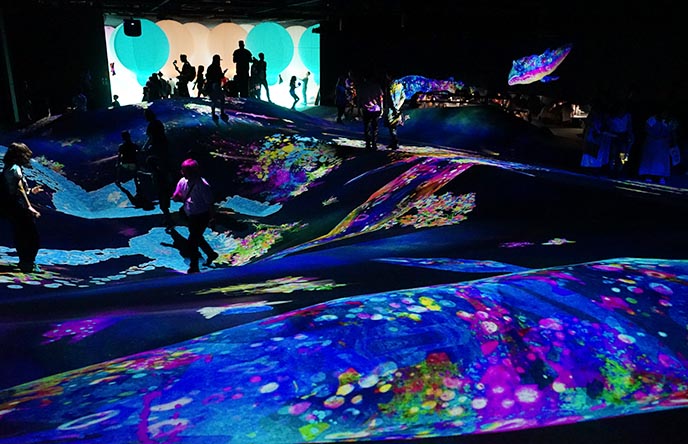
Takashi Kudo, our teamLab guide, spoke about how Borderless explores new dimensions of learning. Today, children engage with computers and apps. In the future, how can we keep using technology to learn in new ways?
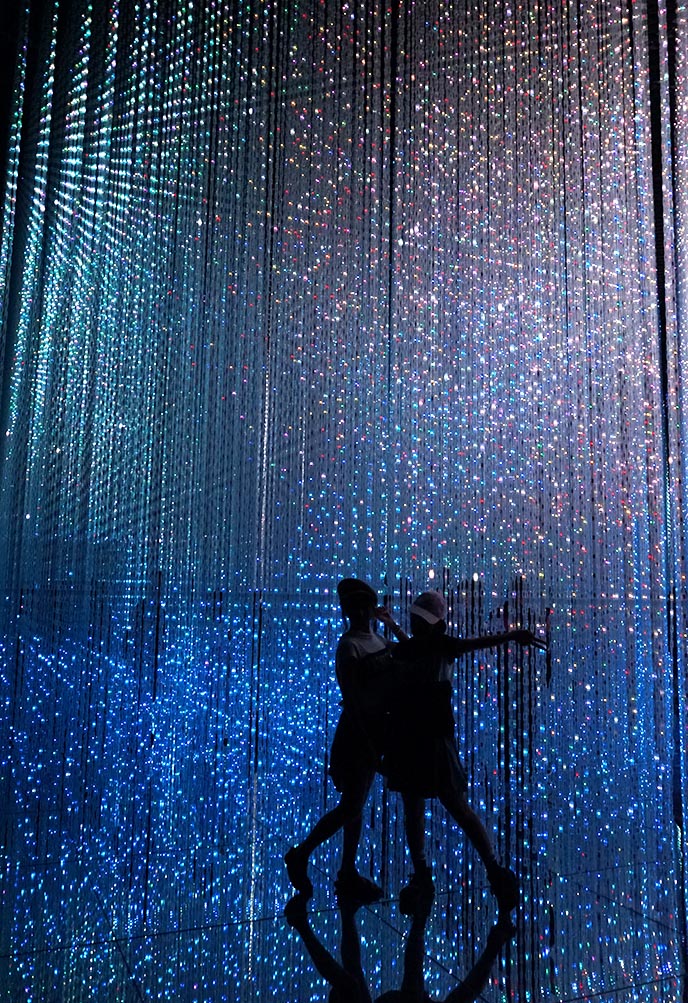
In the “Crystal World,” friends gather to take dynamic silhouettes poses in front of the curtains of sparkling lights.

Another room featured dancing strobes of light set to sound, much like a sci-fi movie or EDM party.
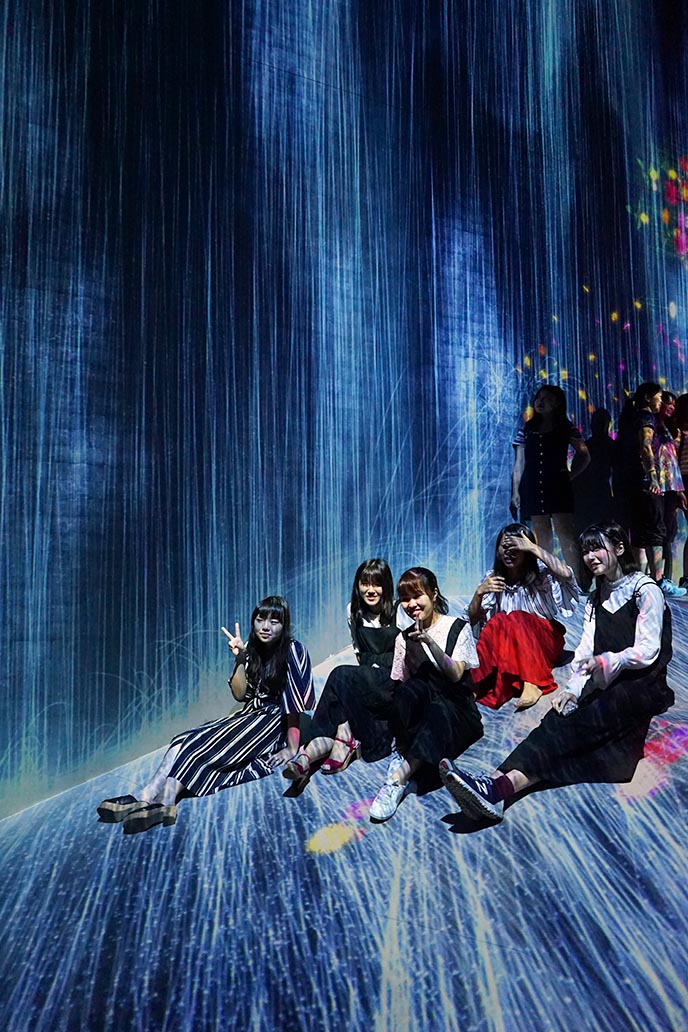
It’s remarkable that these enormous, evocative displays — like this “waterfall” — are made with digital art and sound effects.

Artist Becky Hawkins created a watercolor travel postcard that shows a scene from our tour. “Every few centuries, there’s a revolution that brings about a new way of seeing. The internet is the latest such revolution.
How does our relationship to images change when they can be shared instantly, across the world? We don’t know yet!”
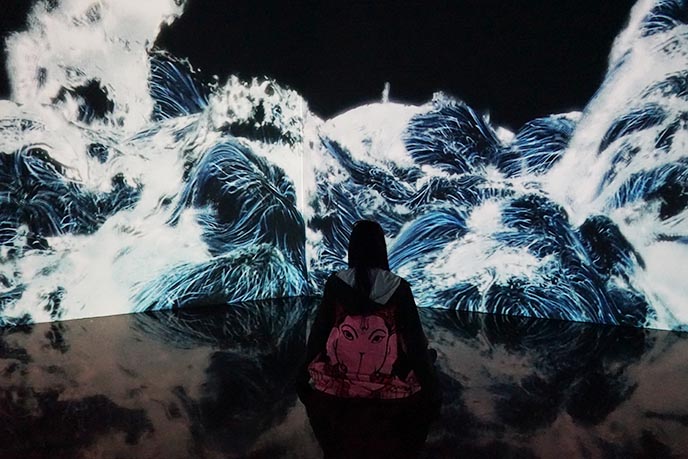
“This room was inspired by Hokusai’s “Great Wave,” We celebrate Japan’s past while we look to the future.”
Takashi told us about Japanese monks who sat by the ocean for decades, meditating. This space encourages you to do the same, in front of the shifting digital waves.
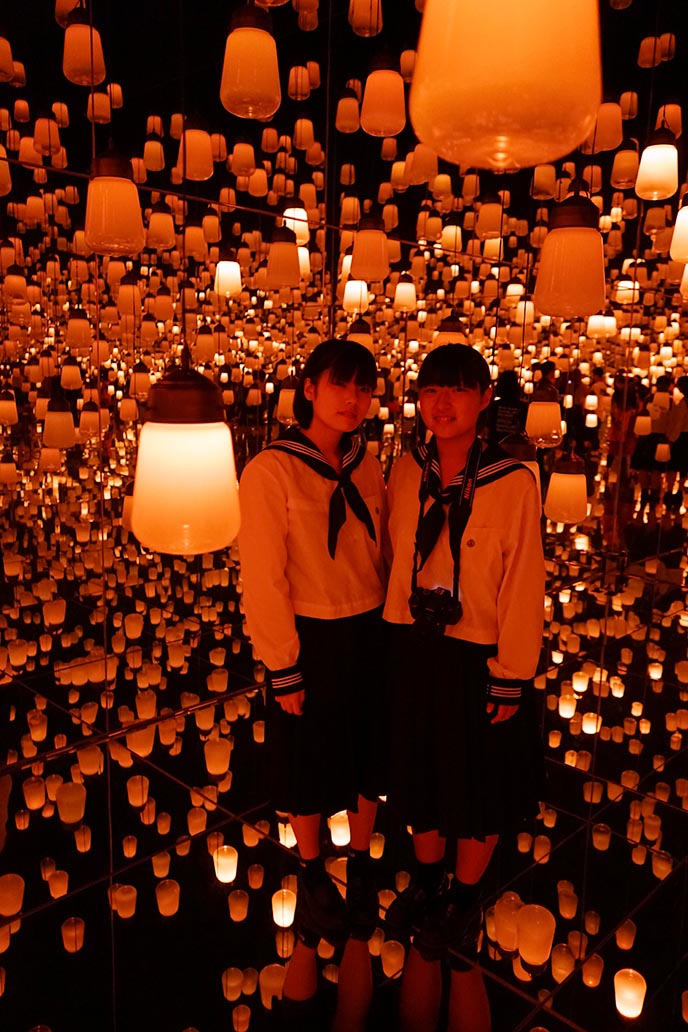
The Forest of Lamps allows only a limited number of people inside at one time, so there may be a line up for this popular exhibit. When you approach a lantern, it responds by emitting light that spreads to nearby lamps.

Becky Hawkins bugs out at Naomi’s insightful connection between the forest and ocean zones.
“‘The Wave’ is a really good parallel, actually, because woodblock printing was another technology that enabled an image to be reproduced and shared on a previously unimaginable scale…”

We peeked into this room designed for children. The screen shows a bird’s eye view of a city, which mirrors the layout of the room.
Anyone can add bridges, homes, and other movable objects to the urban design — which immediately changes what you see on the screen!
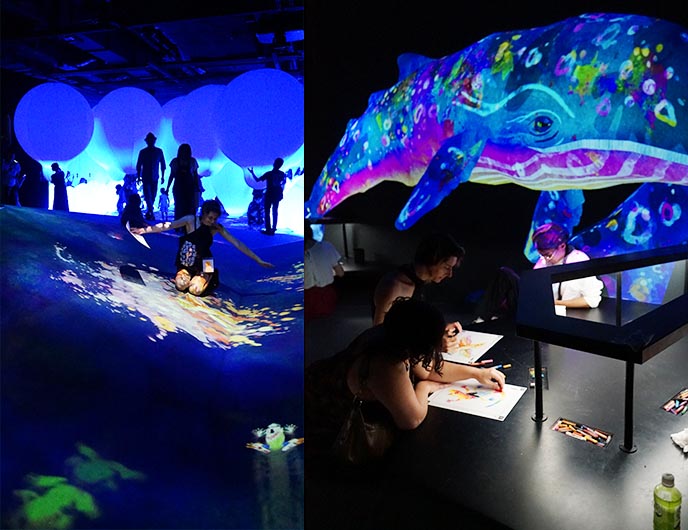
“Future Park” is another educational experience that merges art and technology. The “Sketch Aquarium” lets you add color to outlines of ocean creatures.
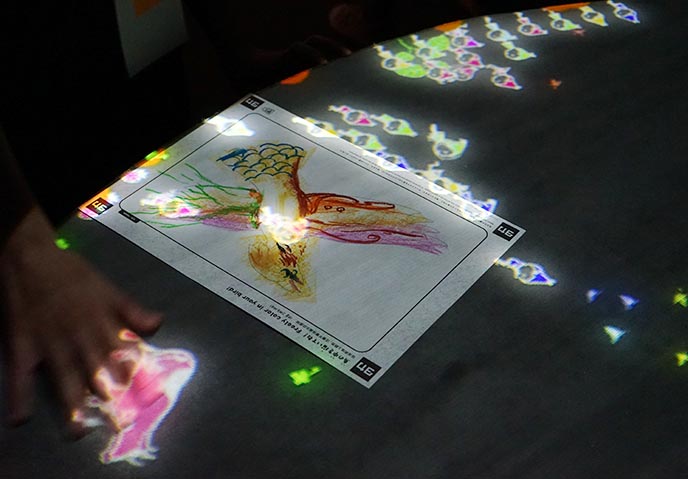
Then, you pass the page through a digital scanner. The creature comes to life as an animated digital image that moves through the exhibit.
Naomi colored in this phoenix, and once she scanned it, the bird flew over the mountains and valleys of the park.
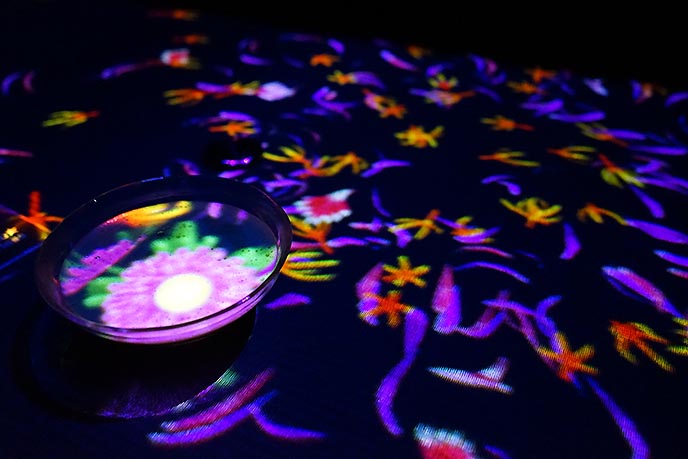
Don’t leave before a cup of matcha (powdered green tea) at the museum’s EN Tea House. In this unusual cafe, you sit on long benches in a dark tearoom.
When the server pours tea into your glass bowl, it lights up with floral patterns. When you sip the tea, neon flowers bloom and petals float out to the table and walls!
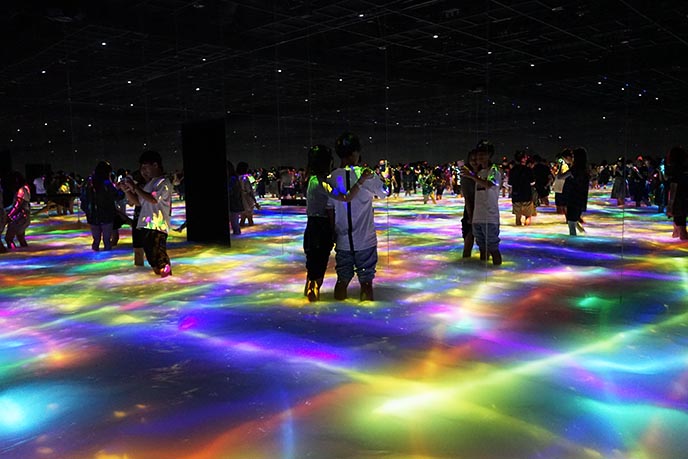
Takashi Kudo then took us to visit teamLab Planets Tokyo — a temporary museum by the same collective, located next to Shin-Toyosu Station. (It requires a separate ticket, which you should also book well ahead of time.) These virtual installations are more intimate, and play with themes of new worlds.
When you enter, you must take off your shoes and walk up a ramp streaming with water! You’ll explore the entire museum barefoot, including parts where you wade through a glowing pond of water.
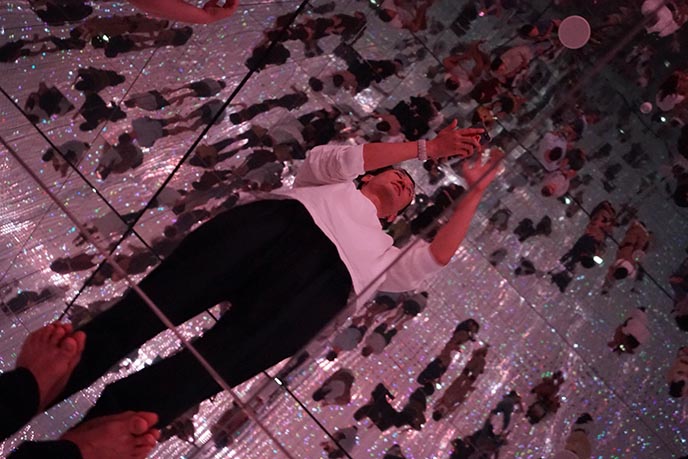
One of the “dimensions,” called the Infinite Crystal Universe, was surrounded by mirrors on all floors and ceilings. Here, Takashi is showing how anyone can use a special app to change the light and sound patterns in this room.
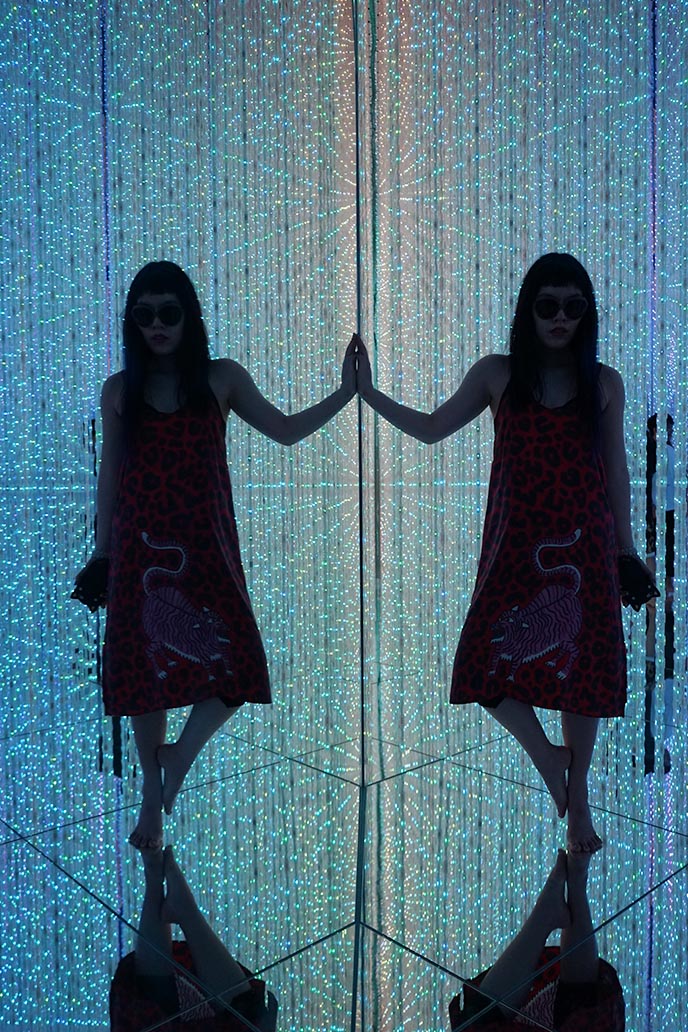
When you look around, you see yourself mirrored to infinity — a trippy feeling, especially amidst these glistening strands of lights.
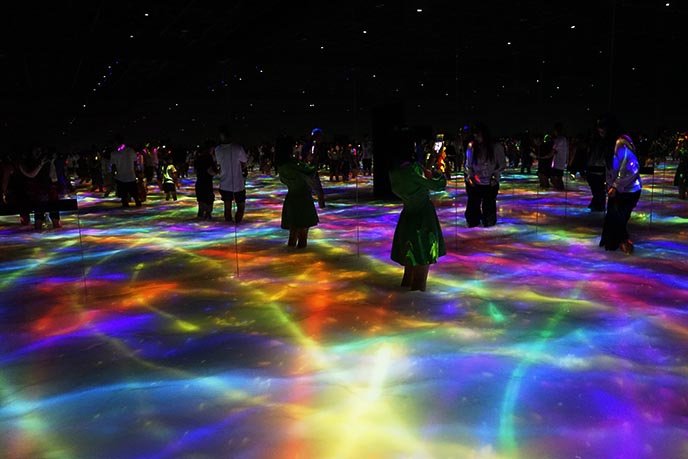
I’ve never visited any art installation like this one, called “Drawing on the water surface created by the dance of koi and people – Infinity.” You wander through a calf-high ocean that is filled with virtual fish and lights.
When you touch one of the goldfish, it bursts into flowers and floats through the water. The visuals are constantly in flux, as each interaction changes how the space looks.
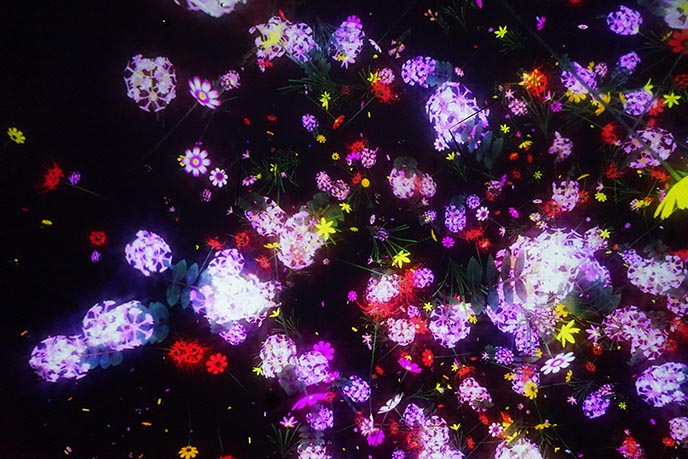
teamLab Planets ends on a beautiful note, with the “Falling universe of flowers.” Lie down, and watch flowers drift throughout the room — blossoming, changing, and dying with the seasons. The floral free-fall evolves in real-time, depending on how you respond to the installation.
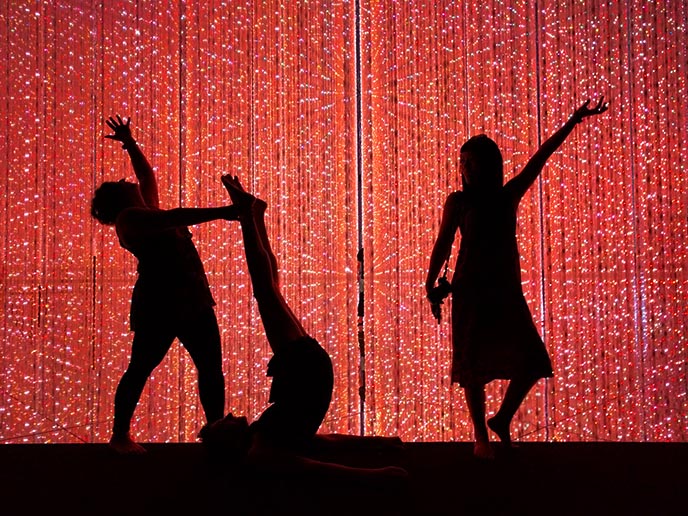
teamLab Planets and Borderless (Mori Digitual Art Museum) are powerful, immersive spaces that merge the boundaries between the viewer and works. Above all — they encourage you to activate your imagination, and have fun with friends! If you are heading to Tokyo, book teamLab tickets as soon as you can, as you don’t want to miss out.
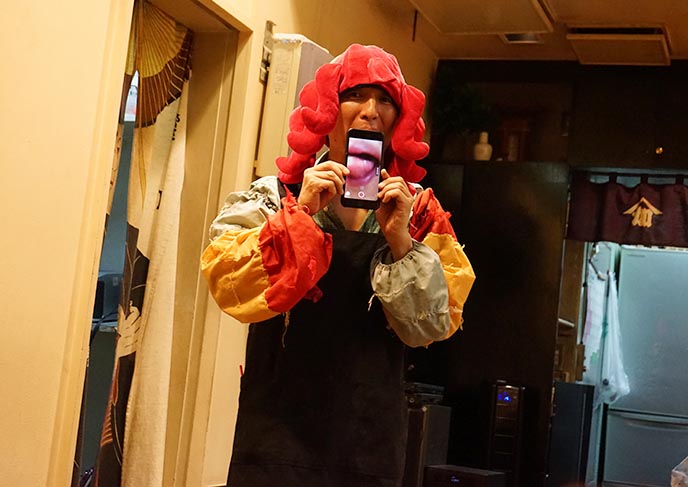
We ended our Tokyo trip with another type of interactive art… Kagaya, our favorite izakaya restaurant! Long-time readers of this blog will know that we always come back to see Mark and his zany performances.

I’ve been to Kagaya at least 6 times now, and his surreal, head-scratching, hilarious antics never get old. Will the teddy bear manage to carry the heavy tray to Trevor, or will he buckle under the weight? We cheered, “You can do it, bear!”
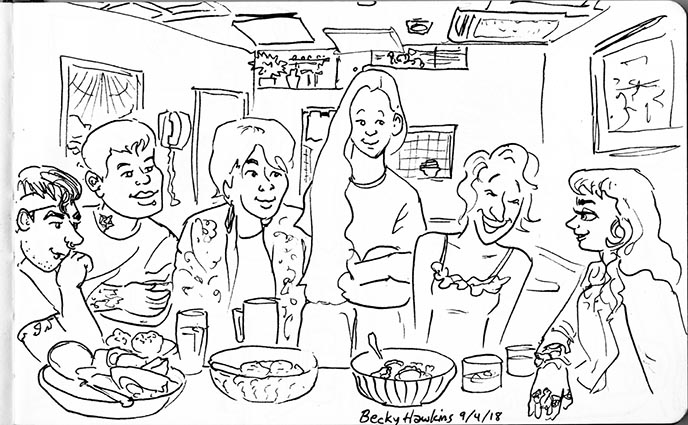
Becky Hawkins made this illustration of our joyful group dinner. Kagaya serves wonderful traditional Japanese food, including mackerel, all types of tofu, kabocha (pumpkin), and sake.

Whenever you order a drink, you get to choose the name of a country from a list on the menu. “Normal Mark” ducks into the closet …. and comes out as a wild character!
I don’t want to ruin the surprise, but you have to trust us: Kagaya is a true gem, and the site of some of my fondest memories in Tokyo. You can reserve at table and find the map to Kagaya here.

There’s no doubt I will be back in Asia soon, to bring more crazy tales to you! I want to visit the new permanent Sailor Moon cafe in Tokyo when it opens… I also have some comprehensive Japanese travel guides coming out on another website, so keep your eyes peeled.
PS – if you’re hungry for more Tokyo tips, I have over 10 years (!!) of subculture coverage on La Carmina blog. You can find everything in my Japan travel section.

 LA CARMINA
LA CARMINA






